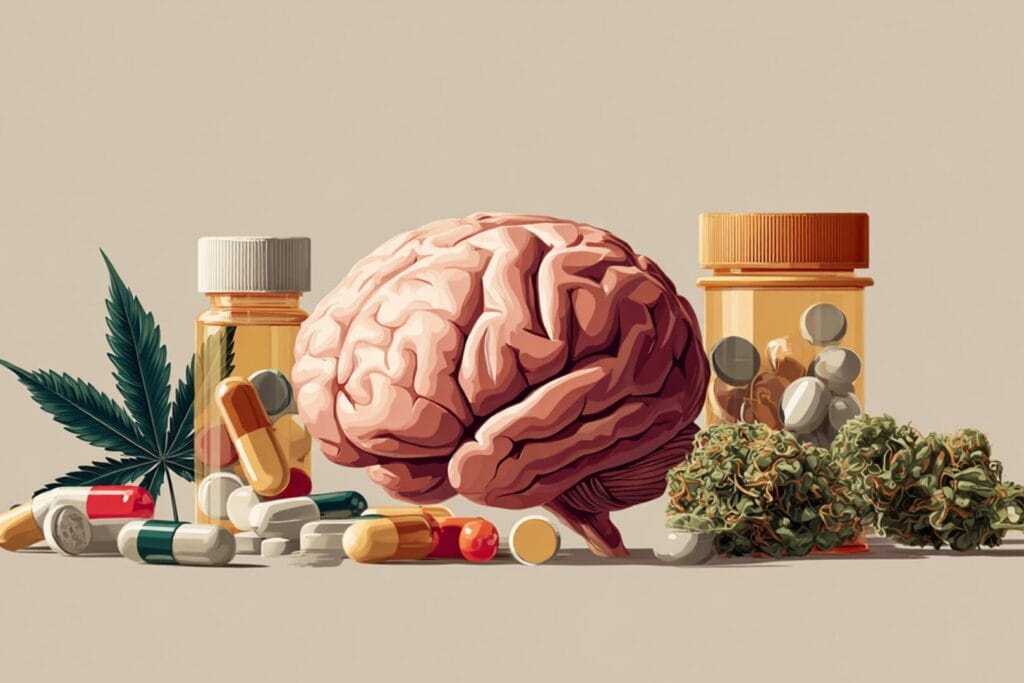Long-term substance abuse doesn’t just affect the body—it takes a significant toll on the mind as well. The psychological impacts of addiction can be profound and far-reaching, often intertwining with emotional and mental health struggles that can feel overwhelming.
Addiction is a complicated disease, and while the physical damage is often visible, the mental and emotional effects can be harder to recognize but are equally important to address.
Understanding the psychological impacts is a crucial step toward healing for those struggling with substance abuse as well as their loved ones.
By exploring how long-term substance use affects the mind, individuals can better understand what they’re facing and how treatment can help them reclaim their mental health, find peace and rebuild their lives.
How Substance Abuse Affects the Brain
There’s a profound effect on the brain stemming from substance use, affecting both its chemistry and structure. The brain relies on a chemical balance (neurotransmitters) to regulate mood, emotions and behavior. Drugs and alcohol disrupt this balance in significant ways.
Disruption of Neurotransmitters
When someone uses substances over a long period, it changes the brain’s natural production of neurotransmitters, including dopamine, serotonin and endorphins. These chemicals are responsible for how we feel pleasure, happiness and reward.
Alcohol, opioids, stimulants and other addictive substances flood the brain with feel-good chemicals, and that creates a temporary high.
Over time, the brain depends on these external substances to feel normal, reducing natural neurotransmitter production. This contributes to feelings of anxiety, depression and an inability to experience pleasure without the substance.
Brain Structure Changes
In addition to chemical imbalances, long-term substance abuse contributes to physical changes in the brain’s structure, especially in areas like the prefrontal cortex and the reward center.
The prefrontal cortex is responsible for decision-making, impulse control, and rational thinking. When weakened, it becomes harder to resist cravings or make sound judgments. At the same time, the reward center becomes overactive, making the brain crave more of the substance to feel the same effects.
These changes can make breaking the cycle of addiction even more challenging, but with proper treatment, the brain can start to heal and restore balance.
Psychological Conditions Linked to Long-Term Substance Abuse
Long-term substance abuse doesn’t just create physical dependence. It also often leads to or worsens psychological conditions.
The effects on mental health can be severe, impacting a person’s ability to manage emotions, cope with stress, and engage in everyday life.
Anxiety and Depression
Substance abuse frequently goes hand-in-hand with anxiety and depression.
In some cases, a person may start using drugs or alcohol to self-medicate these mental health conditions only to find that prolonged use ends up making them worse. Over time, substances interfere with the brain’s ability to regulate mood, leading to increased feelings of hopelessness, constant worry or deep sadness.
Many people find themselves trapped in a cycle, using substances to numb these feelings only to have them return even stronger once the effects wear off.
Paranoia and Psychosis
Certain substances, especially stimulants like methamphetamine, cocaine and hallucinogens, can lead to extreme psychological symptoms, including paranoia and psychosis.
Paranoia involves intense feelings of fear or distrust, often with no real basis in reality.
Psychosis, on the other hand, can include hallucinations, delusions and a complete break from reality.
These experiences can be terrifying and persistent even after someone stops using the substance, requiring professional help to manage.
Mood Disorders
Substance abuse can throw off the natural ability of the brain to regulate mood, leading to significant instability. Individuals could find themselves experiencing sudden, intense mood swings, ranging from irritability and aggression to deep sadness or empathy.
Emotional volatility strains relationships, causes problems at work and at home and can create chaos.
Over time, the destabilization of mood can develop into a more permanent mood disorder.
Cognitive Decline
Long-term substance abuse can impair cognitive functions, affecting the ability to think clearly, focus and make decisions. The brain’s capacity to process information and regulate behavior diminishes over time, deeply impacting day-to-day life.
Memory and Concentration Problems
One of the most noticeable effects of long-term substance abuse is a decline in memory and concentration. Substances disrupt the brain’s ability to form new memories, leading to frequent lapses in short-term memory.
A person may struggle to remember recent events, tasks or conversations.
Along with memory issues, concentration can be impaired significantly.
People find it difficult to focus on tasks for extended periods, easily losing track of what they’re doing or getting distracted.
Cognitive challenges stemming from substance abuse can affect everything from performance at work to personal relationships.
Decision-Making and Impulse Control
Substance abuse particularly impacts the prefrontal cortex, the area of the brain responsible for decision-making, impulse control and rational thinking. Over time, substances weaken this part of the brain, making it harder for individuals to think through the consequences of their actions or resist the urge to engage in risky behaviors.
This decline in impulse control can lead to dangerous decisions such as continuing to use despite negative consequences, engaging in illegal activities or putting oneself in harmful situations. The reduced ability to make sound decisions and control impulses is a hallmark of long-term addiction, which can further complicate the path to recovery.
Social and Behavioral Effects
Substance abuse doesn’t just affect the individual struggling with addiction.
It ripples outward, impacting relationships, social interactions and overall behavior. As the psychological effects of long-term substance use intensify, they can erode the fabric of a person’s social life, leading to isolation and risky behaviors that can further damage well-being and relationships.
One of the most painful social consequences of long-term substance abuse is the gradual isolation it causes. Substance abuse often erodes trust, making it difficult for loved ones to keep healthy connections with the person using drugs or alcohol.
Loved ones may feel betrayed, frustrated or emotionally exhausted, leading to distance and strained relationships.
Substance abuse can also foster shame and guilt and further push a person into isolation.
The cycle of isolation can be deeply damaging, as it often reinforces substance dependence to cope with loneliness and emotional pain.
Recovery and Treatment
One of the most hopeful aspects of recovery is that the brain can heal, thanks to a process known as neuroplasticity. This is what lets the brain form new neural connections and repair damaged pathways, even after years of substance abuse.
With time, the brain can recover much of its function, improving cognitive abilities, decision-making and mood regulation.
However, this doesn’t happen overnight. It requires time, dedication, sobriety and the right treatment.
For many people struggling with long-term substance abuse, addiction is closely tied to underlying mental health conditions like trauma or depression. This is why dual diagnosis treatment is so essential. A comprehensive treatment program addresses both the substance abuse and any co-occurring mental health disorders. Treating one and not the other often leads to relapse or continued suffering.
Dual diagnosis care ensures the individual receives the proper support for their mental health while also addressing the root causes of their addiction.
At San Diego Detox, we use a variety of psychological therapies to help individuals heal mentally and emotionally. Each therapeutic approach we use is designed to help develop healthier coping mechanisms, improve emotional regulation, and set the foundation for long-term recovery.
Contact us today to learn more about evidence-based therapies, holistic healing and compassionate care at our center.
Frequently Asked Questions (FAQs)
Long-term substance abuse is linked to a variety of mental health conditions — most commonly depression, anxiety, and other mood disorders.
Yes — over time, prolonged drug or alcohol use can chemically and structurally alter the brain, particularly in areas that regulate reward, decision-making, and impulse control.
Chronic substance use can lead to social withdrawal, isolation, strained relationships, increased shame or guilt, and behavioral changes — all of which negatively impact social functioning and quality of life.
Long-term abuse can impair cognitive functions such as memory, concentration, and the ability to make rational decisions, often making everyday tasks, work, or relationships more difficult.







